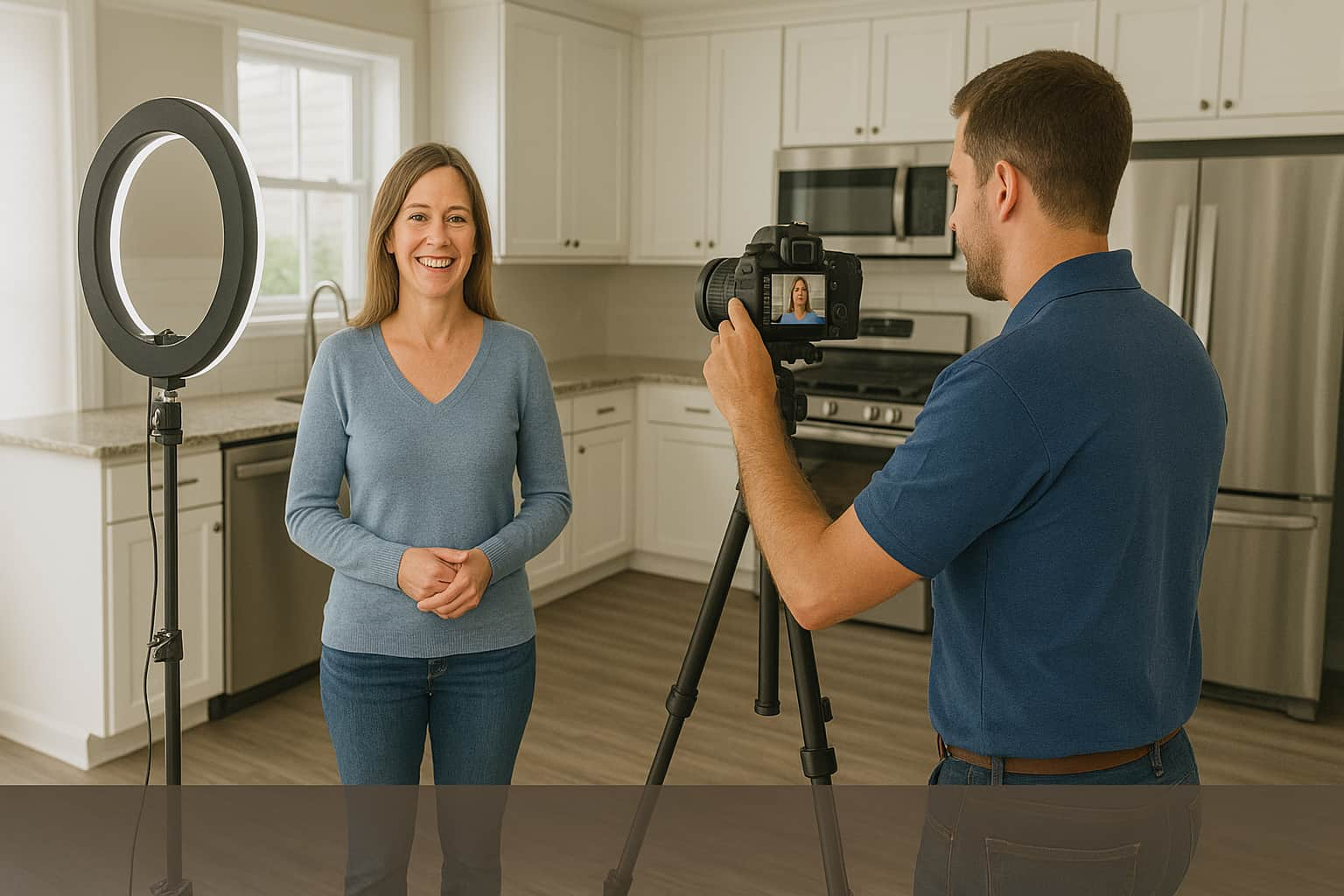How to Generate High Quality Leads for Flooring With SEO
Your customers have flooring problems. They're searching for solutions online right now. But most flooring businesses only focus on selling new floors through traditional marketing strategies. This leaves a huge gap in the market.
When someone's hardwood flooring warps or their carpet gets stained, they need help fast. They don't want to see product catalogs. They want answers from a flooring contractor who knows what they're talking about.
This guide shows you how to build an FAQ library that captures these problem-solving searches. You'll learn to turn flooring problems into high quality flooring leads. Plus, you'll become the go-to flooring company in your area through an enhanced online presence.
Here's what you'll discover in this guide:
Table of Contents
Why Generic Flooring Marketing Fails
How Problem-Solving Content Builds Trust
The Power of Long-Tail Keywords for Lead Generation
Finding Common Flooring Business Problems
Mastering Keyword Research for Your Flooring Services
Building Your FAQ Structure for Growing Your Business
Writing Great FAQ Content for Potential Customers
Technical SEO for FAQs and Digital Marketing
Promoting Your FAQ Library Through Social Media
Measuring Success and Growth in Real Time
Why Generic Flooring Marketing Fails
Most flooring companies focus on keywords like "flooring store near me." This works for some traffic. But it fails to connect with customers experiencing specific issues and doesn't generate exclusive flooring leads.
Think about it. When someone searches "flooring store near me," they're just starting to look around. They might not even know what they want yet.
But when someone searches "how to fix warped hardwood floors," they have a real problem. They need help now. These people are much more likely to buy from your flooring business.
The Trust Factor
Flooring is expensive. Homeowners want to work with experts they trust. When you solve their immediate problem, you build significant trust fast. This trust is crucial for any flooring contractor looking to stand out from competitors.
Generic marketing says "Here's what we sell." Problem-solving content says "Here's how we can help you right now." The second approach wins every time.
Meeting Customers Where They Are
Your customers aren't always ready to buy new floors. Sometimes they just need repairs. Sometimes they want to know if their problem is fixable.
When you answer these questions, you stay connected with customers throughout their journey. You become their trusted advisor, not just another vendor. This approach functions like a lead generation company working around the clock.
How Problem-Solving Content Builds Trust
FAQ pages serve as an invaluable knowledge base, improving the overall user experience by enabling customers to find the information they need quickly and independently. This becomes a powerful tool for flooring services to capture leads without a term contract commitment.
Higher Conversion Rates
People who search for specific problems are ready to take action. They're not just browsing. They have a real issue that needs solving through professional flooring services.
When you provide the exact answer they need, conversion rates go up significantly. These visitors are more qualified than general traffic. Each phone call generated from these searches represents a warmer lead.
Reduced Customer Service Load
Good FAQs answer common questions before customers call. This saves your team time. It also helps customers get answers faster.
Your staff can focus on complex issues instead of repeating basic information. Everyone wins.
Building Your Expert Reputation
When you thoroughly address flooring problems, you show real expertise. Customers see you as an authority, not just a salesperson.
This expert positioning leads to more referrals. People trust experts with their expensive flooring projects.
Transform your expert positioning into systematic referral generation by learning how to get exclusive leads for flooring using customer referrals that leverages your knowledge-based trust.
The Power of Long-Tail Keywords for Lead Generation
Long-tail keywords are longer, more specific search phrases. Instead of "flooring," think "how to fix scratched hardwood floors." These keywords are essential for any lead generation services strategy.
These keywords have three big advantages for your flooring business:
Less Competition
Fewer companies compete for specific problem-solving keywords. This makes it easier to achieve higher rankings in search results.
Your local flooring business can outrank big national sites for these specific queries.
Higher Intent
Long-tail searchers know exactly what they want. They're not just browsing. They have a specific problem to solve through professional flooring services.
This means better conversion rates. These visitors are more likely to become customers.
Voice Search Ready
People use longer phrases when speaking to devices. "How do I fix my squeaky floor?" sounds natural when spoken.
Optimizing for long-tail keywords prepares you for the increasing use of voice search. Voice search is becoming a major way potential customers find flooring services.
The Numbers Don't Lie
Long-tail keywords are 36% more likely to convert than short keywords. Some studies show conversion rates 2.5 times higher.
While each keyword might have lower search volume, the combined traffic adds up to drive substantial qualified traffic. Plus, the quality is much better.
Finding Common Flooring Problems
To build a great FAQ library, you need to know what problems customers actually face. Here's how to find them:
Look at Your Own Data
Start with your customer service records. What questions do people ask most often? Your digital marketing efforts should reflect these common concerns.
Your sales team and installation crews possess invaluable firsthand knowledge of common problems encountered in the field and typical concerns voiced by homeowners. These insights help identify which search engine queries to target.
Check Industry Resources
The National Wood Flooring Association (NWFA) and Carpet and Rug Institute (CRI) publish guides about common problems. These are great starting points.
Home improvement sites like Bob Vila's website also cover frequent flooring issues.
Study Your Competition
Look at other flooring company websites. What problems do they address in their FAQs or blogs?
More importantly, what problems do they miss? You can identify commonly addressed problems and potential content gaps that your business can fill.
Mine Online Communities
Reddit has active flooring communities. Check out r/Flooring and r/HomeImprovement. People describe problems in their own words there.
This shows you exactly how customers talk about their issues. Use their language in your content.
Use Google's Tools
Google's "People Also Ask" (PAA) boxes show related questions. The "Related Searches" at the bottom of results pages reveal more queries.
These tools show you what people actually search for.
Organize Problems by Category
Group problems in ways that make sense to customers:
By Flooring Type:
Hardwood issues (warping, scratches, squeaking)
Laminate problems (peeling, water damage)
Tile troubles (cracks, loose tiles)
Carpet concerns (stains, wear, odors)
For example, hardwood issues might include scratches, warping, gapping, squeaking, and water damage, as detailed by Floor Authority.
By Problem Type:
Water damage
Scratches and scuffs
Stains and discoloration
Noise issues
Installation problems
By Room:
Kitchen flooring (spills, grease, high traffic)
Bathroom flooring (moisture, mildew)
Basement flooring (humidity, flooding)
Mastering Keyword Research for Your Flooring Services
Good keyword research finds the exact phrases customers use when they have flooring problems. Here's how to do it right for your flooring company.
Target High-Intent Keywords
Look for keywords that show people want to solve problems:
Problem + Solution Format:
"How to fix water damaged subfloor"
"Cost to repair scratched hardwood"
"Best way to remove carpet stains"
Question-Based Keywords:
"Why is my floor squeaking?"
"What causes hardwood to warp?"
"When should I replace my carpet?"
These queries are common when users are trying to understand or solve a problem, as noted by SEO experts.
Local + Problem Keywords:
"Hardwood floor repair near me"
"Emergency water damage flooring"
"Local tile repair services"
These searches often result in immediate phone call inquiries for flooring contractors.
Urgent Problem Keywords:
"Emergency floor water extraction"
"Urgent carpet cleaning"
"Same day floor repair"
Use the Right Tools
Free Tools:
Google Keyword Planner (basic search volumes)
AnswerThePublic (question variations)
Google Search Console (current performance)
Exploding Topics (emerging trends)
Paid Tools:
SEMrush (comprehensive keyword research)
Ahrefs (competitor analysis)
Keyword.io (autocomplete suggestions)
Analyze Your Competition
See what keywords your competitors target:
Find local flooring competitors
Check their FAQ sections and blog posts
Use SEMrush or Ahrefs to see their ranking keywords
Look for gaps you can fill
Study Search Results
For each target keyword, look at:
What types of content rank well
What questions appear in "People Also Ask"
What related searches Google suggests
What format works best (how-to, lists, etc.)
Building Your FAQ Structure for Growing Your Business
The way you organize your FAQ library affects both SEO and user experience. Here are the best approaches for any flooring business looking to enhance their online presence.
Choose Your Structure
Hub-and-Spoke Model (Recommended): Create a main "Flooring Problems & Solutions" page. Link to detailed pages for each problem category.
This strengthens internal linking and makes navigation easy.
Library Model: Your main FAQ page acts like a library. Users browse categories to find what they need.
Good for extensive FAQ sections with many questions.
Organize for Users
Think about how customers naturally search for help:
Primary Categories by Flooring Type:
Hardwood Flooring Problems
Laminate Flooring Issues
Tile and Stone Problems
Carpet Troubles
These categories help potential customers quickly find relevant information for their specific flooring needs.
Secondary Categories by Problem:
Installation Issues
Damage and Repair
Cleaning and Maintenance
Replacement Decisions
Create SEO-Friendly URLs
Make your URLs clear and keyword-rich:
Good URL: yourdomain.com/faqs/hardwood-flooring/how-to-fix-warped-floors
Bad URL: yourdomain.com/page123?id=faq&type=hw&prob=warp
Add Navigation Helpers
Breadcrumbs: Show users where they are in your site structure
Search Function: Let users search your FAQs directly
Jump Links: For long pages, add clickable table of contents
Related Questions: Link to similar problems
Make It Mobile-Friendly
Most people search for flooring help on their phones. Your FAQ pages must work perfectly on mobile devices.
Test your pages on different screen sizes. Make sure buttons are easy to tap. Keep loading times fast, as page speed is a critical ranking factor.
Writing Great FAQ Content for Potential Customers
Your FAQ answers need to be helpful, clear, and optimized for search engines. Here's how to write them to connect with potential customers and generate high quality flooring leads.
Use Simple, Clear Language
Write like you're talking to a neighbor, not reading a textbook. Keep language straightforward and easy for the average homeowner to understand. Avoid technical jargon unless you explain it.
Instead of: "Implement moisture mitigation protocols to prevent subfloor degradation."
Write: "Stop moisture problems before they damage your subfloor."
Structure Your Answers
Start with the Direct Answer: Give the solution right away. Don't make people read three paragraphs to find it.
Add Supporting Details: Explain why this solution works and when to use it.
Include Action Steps: Tell people exactly what to do next.
Balance DIY and Professional Help
Many customers want to try fixing problems themselves. Others need professional help. Address both:
For DIY Solutions:
Give clear, safe instructions
List required tools and materials
Warn about potential risks
Know when to stop and call a pro
For Professional Problems:
Explain why professional help is needed
Describe what the process involves
Give realistic cost estimates
Make it easy to contact you
Consider the pros and cons of DIY versus professional installation, which can be adapted to repair scenarios.
Use Visuals Effectively
Pictures and videos make your answers much more helpful:
Problem Photos: Show what the issue looks like
Step-by-Step Images: Illustrate repair processes
Before/After Shots: Demonstrate results
Video Tutorials: For complex procedures
Optimize all images for fast loading. Add descriptive alt text for SEO. If using video content, include accurate transcripts and closed captions to provide text content for search engines to crawl.
Enhance your FAQ answers with compelling visual content by learning how to get quality leads for flooring with videos that demonstrate solutions and build trust with potential customers.
Include Strong Calls to Action
Every FAQ answer should guide users to the next step:
For DIY Solutions: "Need supplies for this repair? Check our flooring materials section."
For Professional Help: "Ready to fix this problem? Schedule your free inspection today."
This direct approach often results in immediate phone call inquiries from qualified prospects.
For More Information: "Learn more about hardwood care in our maintenance guide."
Use a mix of CTA formats and strategic placement where users are most likely to take action, following CTA best practices.
Apply Google's E-E-A-T principles:
Experience: Share real examples from your work
Expertise: Explain the technical details
Authority: Reference your certifications and training
Trust: Be honest about limitations and risks
Technical SEO for FAQs and Digital Marketing
Technical SEO helps search engines understand and rank your FAQ content. Here are the essential elements for any flooring business to improve their search engine visibility.
Add FAQ Schema Markup
Schema markup tells search engines your content is in question-and-answer format. This can get you featured in special search results.
Use JSON-LD format (Google's recommendation). Include the full question and answer text.
Test Your Schema
A variety of tools can simplify creating and validating schema:
Schema Generators:
Merkle Schema Markup Generator (free and straightforward)
Schema App (comprehensive tool)
365i FAQ Schema Generator (free, user-friendly)
WordPress Plugins: Yoast SEO and Rank Math offer built-in schema functionality
Schema Testing: Google's Rich Results Test for validating markup
Target "People Also Ask" Boxes
These boxes appear in search results and drive lots of traffic:
Find PAA questions for your keywords
Answer them directly in your content
Use the exact question as a heading
Provide concise, complete answers
Content structure that Google tends to favor for PAA snippets often starts with a direct answer followed by supporting details.
Build Internal Links
Link between related FAQ pages and to your service pages:
From FAQ to Services: "Need professional help? See our hardwood repair services."
Between FAQs: "This problem is similar to cupping. Learn more about floor cupping."
To Product Pages: "You'll need wood filler for this repair. Shop our selection."
Use descriptive anchor text that includes keywords, following internal linking best practices.
Optimize Page Speed
Fast-loading pages rank better and keep users happy:
Compress images
Minimize code
Use browser caching
Choose fast hosting
Promoting Your FAQ Library Through Social Media
Building great FAQ content is just the start. You need to promote it through various digital marketing channels to get results and attract potential customers.
Amplify your FAQ content reach beyond organic traffic by learning how to get exclusive leads for flooring using paid ads that drive targeted prospects to your problem-solving content.
Make It Easy to Find
Website Navigation: Put FAQ link in your main menu
Homepage Feature: Highlight popular questions
Service Page Links: Connect relevant FAQs to your services
Blog Post Links: Reference FAQs in related articles
Use Social Media
Share FAQ content on your social media channels:
Post seasonal flooring tips
Share before/after problem solutions
Answer customer questions publicly
Create short video explanations
Social media marketing helps expand your reach beyond traditional search engine results.
Email Marketing
Include FAQ links in your newsletters:
Monthly maintenance tips
Seasonal problem prevention
New FAQ announcements
Problem-solving guides
Maximize your FAQ content's reach and lead generation potential by learning how to get more leads for flooring using SMS and email marketing strategies that nurture prospects who find your helpful content.
Train Your Team
Give your staff FAQ links to share:
Sales team can send relevant answers
Customer service can reference solutions
Installers can share maintenance tips
Everyone becomes a content distributor
Measuring Success and Growth in Real Time
Track your FAQ performance to see what's working and what needs improvement. Real time monitoring helps you optimize your lead generation services continuously.
Key Metrics to Monitor
Traffic Metrics:
Organic traffic to FAQ pages
Search ranking improvements
Click-through rates from search results
Engagement Metrics:
Time spent on FAQ pages
Bounce rate
Pages per session
Internal link clicks
Conversion Metrics:
Contact form submissions from FAQs
Phone calls generated
Service page visits from FAQs
Quote requests
These metrics help you understand the true value of your digital marketing investment in FAQ content.
Use the Right Tools
Google Analytics: Track traffic and user behavior
Google Search Console: Monitor search performance
Hotjar/Crazy Egg/Microsoft Clarity: See how users interact with pages
Call tracking: Measure phone conversions
Regular Improvement
Monthly Reviews:
Check top-performing FAQs
Identify low-traffic pages
Update outdated information
Add new questions
Quarterly Updates:
Analyze search trends
Review competitor changes
Update contact information
Refresh images and videos
Annual Overhauls:
Restructure based on user feedback
Major content updates
Technical SEO improvements
Design refresh if needed
Your Path to FAQ Success
Building a comprehensive flooring FAQ library takes time, but the results are worth it. You'll attract more high quality flooring leads, build stronger customer relationships, and establish yourself as the local flooring expert.
This approach works better than any term contract marketing service because you own the content and results. Your FAQ library becomes a 24/7 sales tool that works even when you're sleeping. It positions you as the expert potential customers want to work with.
Start building your FAQ library today. Your future customers are searching for answers right now. Make sure they find you.
To get more pay per call flooring leads today, sign up for free with ResultCalls!

Alex Gambashidze
Marketing Associate at ResultCallsHello everyone! My name is Alex and I write these blogs to help educate small business owners on different ways to grow their business. My goal is to make lead generation as easy as possible for you. After reading these blogs, I hope you leave with some actionable steps that will get you closer to growing your business :)
2,000+
Happy local businesses
See what some of them have to say.


